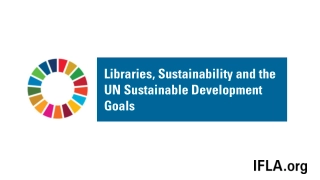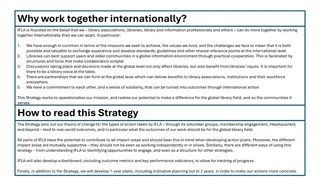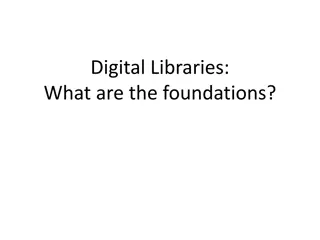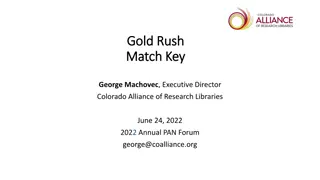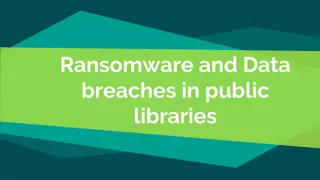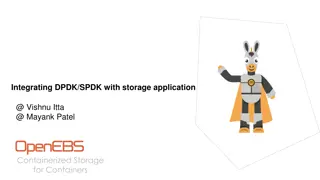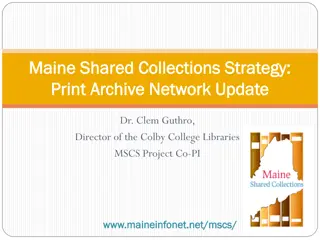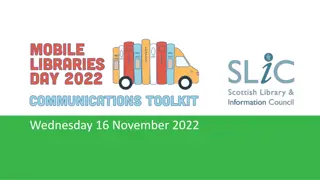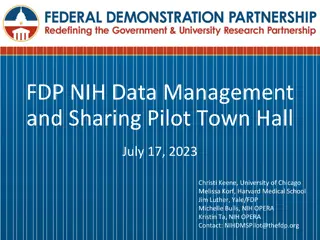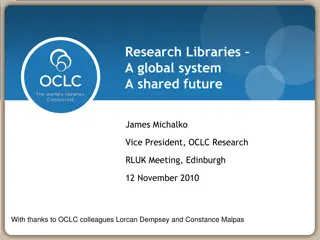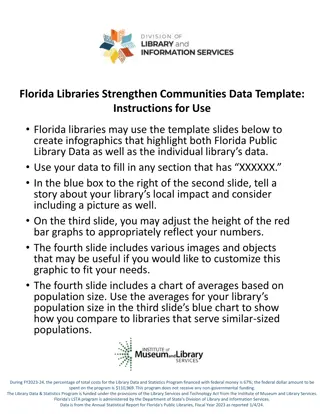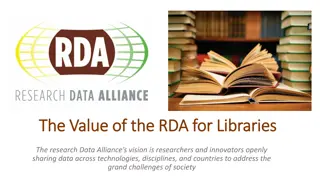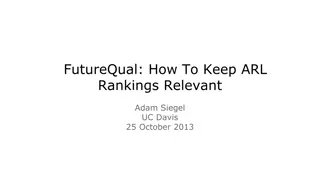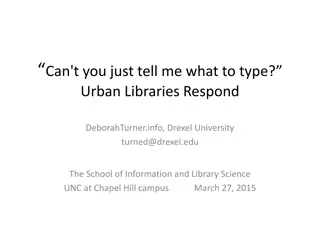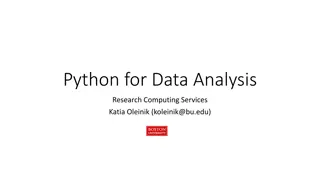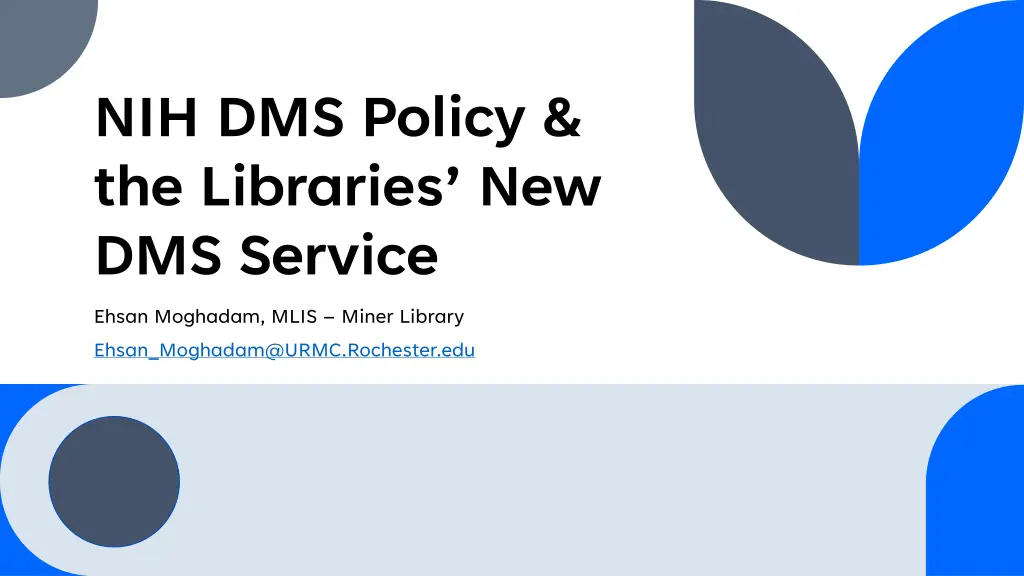
Data Management and Sharing Policy for NIH Researchers
Learn about the NIH Data Management and Sharing Policy, the requirements for managing and sharing research data funded by NIH, including the need for a Data Management and Sharing Plan (DMSP) in grant applications. Understand what scientific data includes, justifiable reasons for limiting data sharing, and how researchers can comply with the policy to ensure transparency and reproducibility in scientific research.
Uploaded on | 0 Views
Download Presentation

Please find below an Image/Link to download the presentation.
The content on the website is provided AS IS for your information and personal use only. It may not be sold, licensed, or shared on other websites without obtaining consent from the author. If you encounter any issues during the download, it is possible that the publisher has removed the file from their server.
You are allowed to download the files provided on this website for personal or commercial use, subject to the condition that they are used lawfully. All files are the property of their respective owners.
The content on the website is provided AS IS for your information and personal use only. It may not be sold, licensed, or shared on other websites without obtaining consent from the author.
E N D
Presentation Transcript
NIH DMS Policy & the Libraries New DMS Service Ehsan Moghadam, MLIS Miner Library Ehsan_Moghadam@URMC.Rochester.edu
Agenda NIH Data Management & Sharing Policy Data Management and Sharing | Data Services & Resources Q&A 7/3/2025 2
NIH Data Management & Sharing Policy
DMS Policy The NIH Data Management and Sharing (DMS) Policy is a set of requirements and guidelines related to the management and sharing of research data generated by work funded wholly or partially by the National Institutes of Health (NIH). This policy applies to all proposals received after January 25th, 2023, that result in the generation of scientific data. 7/3/2025 4
DMSP A Data Management and Sharing Plan (DMSP) is a document included in applicable NIH proposals that prospectively outlines how a research team intends to manage, preserve, and share the scientific data associated with the proposed work. 7/3/2025 5
In Summary Researchers applying for NIH funding need to: Write a DMSP as part of their grant application Comply with it (therefore, share their scientific data) 7/3/2025 6
What is Scientific Data? It includes It does not include Laboratory notebooks Preliminary analyses Compared case report forms Drafts of scientific papers Plans for future research Peer reviews Communications with colleagues Physical objects such as laboratory specimens. Any data commonly accepted in the scientific community as of sufficient quality to validate and replicate research findings, regardless of whether the data are used to support scholarly publications Any data needed to validate and replicate research findings NIH. (n.d.). Research covered under the data management & sharing policy. 7/3/2025 7
Justifiable Reasons for Limiting Sharing of Data Reasons include Informed consent will not permit or will limit the scope or extent of sharing and future research use Existing consent prohibits sharing or limits the scope or extent of sharing and future research use Privacy or safety of research participants would be compromised and protective measures such as de-identification and Certificates of Confidentiality would be insufficient. Explicit federal, state, local, or Tribal law, regulation, or policy prohibits disclosure Restrictions imposed by existing or anticipated agreements Datasets cannot practically be digitized with reasonable efforts It is understood that some data cannot be shared openly or even at all, due to certain ethical, legal, and social issues. NIH. (n.d.). Frequently asked questions (FAQs). 7/3/2025 8
However, you MUST include a rationale for why scientific data will not be shared. 7/3/2025 9
When Does it Need to be Shared? According to the DMS Policy, scientific data needs to be shared by the earlier of two timepoints: The time of an associated publication OR The end of the performance period (unless the grant enters into a no-cost extension). In the case of a no-cost extension, data management and sharing-related requirements are extended to the end of the extended performance period. 7/3/2025 10
DMSPs for NIH Require 6 Elements Data Types Related Tools, Software and/or Code Data Standards Data Preservation, Access, and Associated Timelines Data Sharing Agreements, Licenses, and Other Use Limitations Oversight of Data Management NIH. (2020). Supplemental information to the NIH policy for data management and sharing: Elements of an NIH data management and sharing plan.
Data Type Summary of the types and estimated amount of scientific data. Descriptions may include data modality, level of aggregation, and degree of data processing. Description of which scientific data from the project will be preserved and shared. Remember, NIH does not anticipate for all scientific data to be shared. You must provide a rationale for these decisions. A brief listing of the metadata, other relevant data, and any associated documentation that will be made accessible to ensure the scientific data is understandable and interpretable. NIH. (2020). Supplemental information to the NIH policy for data management and sharing: Elements of an NIH data management and sharing plan. 7/3/2025 12
Data Type This project will produce imaging data generated/obtained from ultrasonography. Data will be collected from 10 of research participants/specimens/experiments, generating 1 datasets totaling approximately half a GB [amount of data] in size. The following data files will be used or produced in the course of the project: DICOM. Raw data will be transformed by filtering and enhancing the images and the subsequent processed dataset used for statistical analysis. To protect research participant identities, individual data will be made available for sharing. Adapted from NIH. (2022). 2023 NIH Data Management and Sharing Policy. 13
Related Tools, Software and/or Code List the names of tool(s) and software needed to access or manipulate shared scientific data to support replication or reuse. If necessary, specify how these tools can be accessed, and if the tools are likely to remain available. Imaging data will be made available in DICOM format, which requires the use of MicroDicom to be accessed and manipulated. The MicroDicom tool, which can be used to view the images is available free of charge through https://www.microdicom.com/. NIH. (2020). Supplemental information to the NIH policy for data management and sharing: Elements of an NIH data management and sharing plan. Adapted from NIH. (2022). 2023 NIH Data Management and Sharing Policy. 7/3/2025 14
Standards Indication of what standards will be applied to the scientific data and associated metadata: Data formats Data dictionaries Data identifiers Definitions Unique Identifiers Other data documentation Plan may indicate that no consensus data standards exist for the scientific data and metadata NIH. (2020). Supplemental information to the NIH policy for data management and sharing: Elements of an NIH data management and sharing plan. 7/3/2025 15
Standards To facilitate their efficient use, all of our data and materials will be structured and described using the following standards: Network Common Data Format. Alternatively Formal standards for DICOM data have not yet been widely adopted. However, our data and other materials will be structured and described according to best practices. Adapted from NIH. (2022). 2023 NIH Data Management and Sharing Policy. 16
Data Preservation, Access, and Associated Timelines Name of repository(ies) where data will be archived How the scientific data will be findable and identifiable (i.e., persistent unique identifier) When the scientific data will be made available and for how long. Identify any differences in timelines for different subsets of scientific data to be shared. Scientific data should be shared as soon as possible, and no later than time of an associated publication or end of the performance period. NIH. (2020). Supplemental information to the NIH policy for data management and sharing: Elements of an NIH data management and sharing plan. 7/3/2025 17
Data Preservation, Access, and Associated Timelines All dataset(s) that can be shared will be deposited in Figshare. The Figshare Repository provides metadata, DOI persistent identifiers, and long-term access. This repository is supported by University of Rochester and dataset(s) are available under a Creative Commons CC0 license. Data will be made available as soon as possible or at the time of associated publication, whichever comes first. Adapted from NIH. (2022). 2023 NIH Data Management and Sharing Policy. 18
Access, Distribution, or Reuse Considerations Describe any factors affecting subsequent access, distribution or reuse of scientific data related to: Informed consent Privacy and confidentiality protections consistent with applicable federal, Tribal, state, and local laws, regulations, and policies De-identification Certificates of Confidentiality Other Protective Measures Note whether access to scientific data derived from humans will be controlled (i.e., made available by a data repository only after approval). Note any other considerations that may limit the extent of data sharing NIH. (2020). Supplemental information to the NIH policy for data management and sharing: Elements of an NIH data management and sharing plan. 7/3/2025 19
Access, Distribution, or Reuse Considerations There are no factors that will affect subsequent access, distribution or reuse of the scientific data. All data will be de-identified and we will not place any access controls over the data. 20
Oversight of Data Management and Sharing Indicate how compliance in the Plan will be Monitored and managed Frequency of oversight By whom (e.g., titles, roles) NIH. (2020). Supplemental information to the NIH policy for data management and sharing: Elements of an NIH data management and sharing plan. 7/3/2025 21
Oversight of Data Management and Sharing Key Aspects to Consider: Who provides oversight? What are the various stakeholders roles and responsibilities? The PI on this project will be responsible for all aspects of data management and sharing, including collecting, analyzing, and describing the data, as well as uploading the data to [INSERT REPOSITORY NAME]. Compliance with the Plan will be monitored and managed, [include frequency of oversight], and by whom (e.g., titles, roles). Adapted from Samuel J. Wood Library. (2022). Oversight of Data Management and Sharing. 22
New DMS Service & Resources
Library Resources NIH-Specific DMS Resource Guide This guide offers detailed answers to common questions related to the NIH DMS Policy and has advice on how to create a DMSP for the NIH. General DMS Resource Guide This guide offers detailed advice on how to create DMSPs, and how to manage, organize, document, store, and share your data. Templates Templates using UR language. Email: dataservices@library.rochester.edu 7/3/2025 24
UR Tools DMPTool Institutional Login Create DMSPs within the tool with the help of templates. Users can also submit their DMSPs to be reviewed in the tool. Use your University of Rochester email to receive institutional access. (Note: UR and URMC are separate). Figshare Generalist data repository. LabArchives An electronic laboratory notebook helps with the organization and management of data. 7/3/2025 25
NIH Resources Link to the Policy & Instructions on How to Write It That Constitutes as Research that Needs to Be Shared Under the NIH Policy Domain-Specific Data Repositories Draft of a Template Supplied by NIH Format, including citations, file names, file sizes font, hyperlinks, page limits, etc. 6 main elements to include Budgeting for Data Management and Sharing Submitting Human Genomic Data NIH FAQ, including information on human data, and when data should or should not be shared 7/3/2025 26
Service Types Chat DMSP Review Receive feedback on a draft of a DMSP for any funder. Consultation Receive personalized one-on-one assistance via zoom or in-person. Small groups can also use this service. Training Receive answers to questions, recommend resources, and referrals to appropriate professionals. Receive instruction for your research group, organization, or class. Response within one business day usually immediate. Response within 1-3 business days. Can make an appointment for a time convenient to you using our calendar. Via email we can decide on an appropriate time and date for the training. 7/3/2025 27
I need to write a DMSP for the NIH, and I dont know where to start. My research involves genomic data. Do you have any resources that can help me? 7/3/2025 29
Answer You can learn more about creating data management and sharing plans on our Miner Library Guide. We also have templates you can use. Additionally, we have institutional access to the DMPTool, just make sure you login with your university email. Within this tool you have access to many templates, and you can submit your data management and sharing plan for review. You can also have your DMSP reviewed by emailing it to dataservices@library.rochester.edu. For additional guidance on working with genomic data please also consult: Genomics Research Center: URgenomics@urmc.rochester.edu Visit the URMC Genomics Research Center website 7/3/2025 30
I have heard about a tool the university has that can help with writing a DMSP. What tool is this, and how can I log in? 7/3/2025 31
Answer The tool you are referring to is the DMPTool. In order to login to the DMPTool, you should use your institutional email. You should then be re-directed to the SSO screen, where you type in your id and your password. 7/3/2025 32
How can I submit my NIH DMSP to be reviewed? 7/3/2025 33
Answer You can have your DMSP/DMP reviewed by emailing it to dataservices@library.rochester.edu. Alternatively, you can submit it directly for review in the DMPTool. 7/3/2025 34
I am not sure what data repository to use to share my data, and I need to include this information in my DMSP. 7/3/2025 35
Answer You should use a subject-specific domain repository. You can find a list of NIH-approved subject-specific domain repositories here: https://www.nlm.nih.gov/NIHbmic/domain_specific_repositories.html If you cannot find a suitable subject-specific domain repository, then you should use Figshare. Figshare is a generalist repository supported by the University of Rochester. When we have institutional access to Figshare, you can use your institutional email when you login to receive institutional access. You can find Figshare here: https://figshare.com/ 7/3/2025 36
I'm not sure what data needs to be included in my DMSP. Can you provide some guidance on what types of data are typically included in these plans? 7/3/2025 37
Answer Scientific data needs to be shared, which is defined as any data needed to validate and replicate research findings. This does not include such things as laboratory notebooks, preliminary analyses, compared case report forms, etc. You can learn more about this on the NIH's page about research data. It is also understood that some data cannot be shared openly or even at all, due to certain ethical, legal, and social issues. You can read the list of accepted reasons on the NIH s FAQ. If you decide you cannot share some of your scientific data, or if you will limit sharing, share the reason why in your DMSP. 7/3/2025 38
My research involves survey data. What are some generalist/domain specific repositories for this type of data? 7/3/2025 39
Answer ICPSR: is a large repository of social science data, including medical survey data. Additionally, ICPSR allows users to assign different levels of access to their data, ensuring that any privacy or confidentiality concerns are addressed. (See also NACDA and OPENICPSR) Zenodo: assigns a digital object identifier (DOI) to each dataset, making it easy to cite and access. In addition, users can assign a Creative Commons license to their data, making it clear how the data can be reused. Figshare: Beyond the features above, Figshare also has a robust metadata system that makes it easy for others to discover and understand the data. 7/3/2025 40

